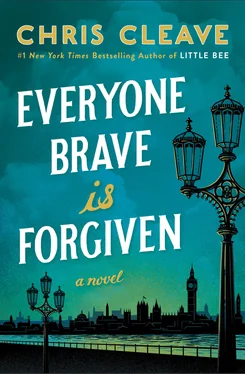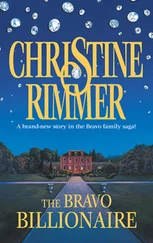“Perhaps I ought to go to him.”
“Yes, and perhaps you should knit him balaclavas, and bake him flapjacks iced with your tears, and send him woollen socks.”
“Oh, do put a woollen sock in it.”
“But he is in the Cotswolds, darling, not the Crimea.”
Mary ignored her. “I will go to see the child’s father.”
Hilda snorted.
“No, really. I will talk to him, and express my concerns.”
“But what good will that do?”
“He probably doesn’t understand our system. He most likely does not realize that he has a perfect right to bring his son back home.”
“Sorry to nitpick,” said Hilda, “but you see, there’s a war.”
“Yes, but do you really think there’ll be bombing? This beastly thing has droned on for how long now?”
“Seven months.”
“And the only pasting we’ve had is with posters urging valor.”
“Even so, you’re hardly going to tell the father to bring the boy home.”
“Surely it is my duty to tell him that he could . This is the thing, you see: unless one more or less lives with the authorities, as I do, one probably doesn’t understand that one can simply say ‘no thank you’.”
“So you are planning to walk into a Negro family’s house—”
“I was planning to knock.”
“—and tell them what they should do with their child.”
“What they could usefully do, yes.”
“Notwithstanding your belief that they are just as intelligent as us.”
Mary frowned. “You are a mousetrap of a friend, all soft cheese and hard springs.”
Hilda beamed. “I use you for practice. One day I’ll have a husband.”
Mary took a second envelope from the tray. “God help the poor man.”
“God will take my side,” said Hilda. “He is only human, after all.”
“Oh!” said Mary, blushing slightly. “This one’s from Tom.”
“Come on, read it out.”
Mary drew Tom’s letter closer. “I think I might rather…”
“Oh, go on! Don’t be such a prude!”
“It’s just that I’d…”
A cough came from the end of the breakfast room, by the double doors, which had swung open soundlessly. Palmer’s cough had the twin qualities of apology and watershed. Mary thought him the very best.
“Miss Hilda?” he said.
“Yes?”
“I have taken the opportunity to stop a cab for you.”
Hilda blinked. “Oh. Yes. Well, thank you, Palmer.”
The imperceptible nod. The dispassionate eyes, already fading from memory. Palmer’s face had the property of oneness with the crockery and the dado rails, while his structuring of the day had the feature of seeming contiguous with one’s own desires — so that Hilda, even as she stood, must already be convinced that she had somehow wanted the taxi. Mary supposed that an asset like Palmer would be a supreme unguent in these times of heightened stress at the ministries. She felt a twinge of apprehension at the thought that he might be requisitioned.
She kissed Hilda on both cheeks, waved her off down the steps into the drizzling morning, and opened Tom’s letter in the hallway.
Dear Miss North,
So: Tom was ‘Miss North’ing her, on headed notepaper from the Education Authority. Mary thought she might fall down. She leaned against the hall stand with its cut-glass jar of peonies. She hadn’t thrown wine over Tom at their last dinner. Nor had she gone the other way, undressing over dessert. All she had done — and this hardly seemed to merit the official stationery treatment — was to have drunk slightly too much and to have asked him, quite politely, if he wouldn’t mind kissing her.
Dear Miss North,
From the records of this office I see that following your release from your posting to Hawley Street School you have no current role with the Authority.
Mary felt that she might cry. It wasn’t as if she had hidden it.
I note also your several requests to this office to be allowed to resume your war service in teaching.
Oh — perhaps she had slightly nagged him. But she had been quite fun about the whole thing — or at least she had tried to be — and the awkward truth of it was that she really did want to teach, and she really did like him. Perhaps she had been clumsy in asking to have both. She read Tom’s next line through splayed fingers, in case it was too awful for words.
I am therefore pleased to inform you of your selection by this office for a new position that has been created at Hawley Street School. You are to report to—
Mary read no further until she was already in a cab.
You are to report to these offices to collect keys and then make the building ready. You are to prepare one classroom of robust construction with access to basement or cellar in case of air raid. You are to make arrangements in anticipation of a class of mixed ages and abilities.
If Tom’s intention had been to avoid any appearance of impropriety by keeping the communication official, then she rather subverted it by rushing to his office, dragging him out to the café over the road, and drinking only three sips of tea before kissing him on the cheek. He touched his face as if her lips might have left a tangible remainder: a smoking impact crater, or an epistolary X with the ink still wet below the signature.
Later, when she was alone in the raw wet wind, strangers smiled at her in the street. It was eerie. The raindrops were champagne bubbles bursting on her skin. The iridescent spills of fuel oil on the wet tarmac of the road were tiny proofs of the covenant.
She supposed she must be in love. That Tom was slightly infuriating, and that she didn’t mind in the slightest, might be proof of it. And of course it would be nice if he were more daring about the whole thing, but she could be patient. Soon Tom would realize that there was nothing more important than Mary North — that it was only her sorcery causing the planets to stay aligned and preventing the milk from curdling.
Almost as strange as being in love was being in it with someone she liked: someone her mother would not countenance nor Hilda even consider. Without the war, how would one ever meet an ordinary man like Tom?
And here was what she wanted to know (now that she had left the café, and London closed around her with its smell of coal smoke and truck exhaust and Tube ventings and railway grease and frying and horse droppings and wet masonry and exhaled cigarettes and damp worsted overcoats and quick brown water coursing in the gutters and slow brown water infusing with disintegrating newsprint in the puddles, along with the butts of everything that had already been smoked, in anarchic and listing flotilla) — here was what she wanted to know (as the clouds made the day dark and she pulled her mackintosh tight and crossed Chalk Farm Road between the cars with their slotted headlights that made them look as if they had just arisen after a heavy night and were fumbling for the tin of aspirin) — here was what she wanted to know: was one meant to feel certain, about love?
She carried on down Chalk Farm Road, lighting a cigarette and exhaling a little of her buoyancy. Her feet seemed to touch the pavement again, and it was wet, and she noticed the water stains on the mid-tan leather of her oxfords.
After their last dinner — the slightly-too-much-wine dinner — they had gone for a walk on Hampstead Heath, in a mist so thick as to have been almost a paste. You could have lost your gloves in the fog and found them half an hour later, suspended in the air at wrist height. She had tried to get them lost in the vapors but he, misreading the situation entirely, had piloted them back to safe streets with a quiet and unerring skill. If it had rather irked her that she must contrive to produce in Tom the behaviors her mother insisted held primacy in all men, then she had forgiven him on the spot when he gave her a shy, proud smile. Her heart had lifted in her chest, as the magazines insisted it must.
Читать дальше












